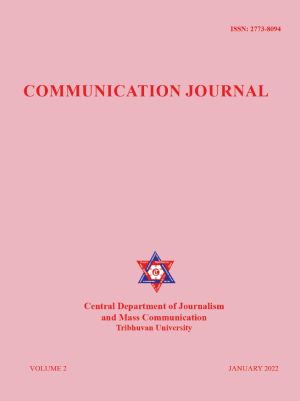Journalist's Socialization : Main Impetus for Good Governance
DOI:
https://doi.org/10.3126/cj.v2i1.57013Keywords:
socialization, communication, journalist, journalism, media, good governanceAbstract
Under the theoretical framework of Harold Lasswell's Communication Theory, this study focuses on the role that journalists' socialization plays in shaping the social understanding of good governance through the use of the media. In the age of social media and technology, it is obvious that people learn a lot from the various media they use in their lives and how they act. As, Harold Lasswell proposes that there is consistently connection between the communicator, message, medium and the beneficiary, it is a colossal test of the communicator or the source to spread the positive and advantageous message to the collector or the crowd. The sender is the most important factor in moving society in a particular progressive direction. Because of this, the journalist's role in society is most important in shaping society. However, the journalist's mindset is formed before socialization, while the audience's life is shaped by the media and political leaders' codes of conduct. Journalism, on the other hand, is not unaffected by national politics because individuals enrol in various programs for their own benefit. As a result, the primary focus of this study on journalists' socialization for good governance in Nepal is on Lasswell's communication model: who says what, how it affects whom, and why.




